Question
Henrick Alfredsson was employed as an investment advisor with a stock brokerage. His wife, Jane Martine, was employed as a wholesale sales agent by a
Henrick Alfredsson was employed as an investment advisor with a stock brokerage. His wife, Jane Martine, was employed as a wholesale sales agent by a small Canadian private corporation engaged in the manufacture and distribution of automobile-care products, namely wax coatings and polishes. The private corporation engaged Alfredsson to place $200,000 worth of its shares among a small group of investors. To assist him, the corporation gave Alfredsson promotional documents containing its sales projections for the next three years, and advised him that the firm intended to "go public" within another three years. Neither Alfredsson nor Martine had ever seen the manufacturing facility, which they were told was located in the United States, nor did Alfredsson make any further inquiries into the financial health of the company. He duly sold the shares to interested clients who were already customers of his brokerage house. As matters turned out, the Canadian firm did not own a U.S. factory and had only rights of distribution. Moreover, the sales projections were wildly optimistic and, in time, the rights to distribute in Canada were lost altogether. The shares in the Canadian company became worthless as a result, and the investors sought redress from Alfredsson personally, as well as his employer, the brokerage.
Comment on the issues raised in this situation. If this was brought before you as the provincial securities regulator, which issues stand out the most, and what redress or penalty (if any) would you impose?
Step by Step Solution
There are 3 Steps involved in it
Step: 1

Get Instant Access to Expert-Tailored Solutions
See step-by-step solutions with expert insights and AI powered tools for academic success
Step: 2

Step: 3

Ace Your Homework with AI
Get the answers you need in no time with our AI-driven, step-by-step assistance
Get Started


